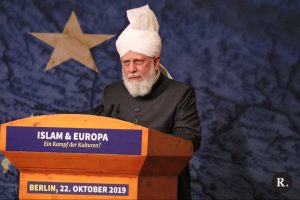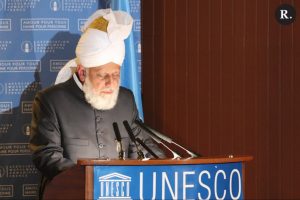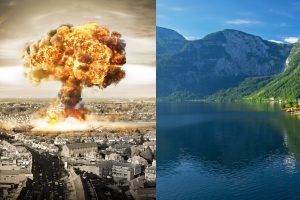ADDRESS BY WORLDWIDE HEAD OF THE AHMADIYYA MUSLIM COMMUNITY AT THE DUTCH NATIONAL PARLIAMENT

On 6 October 2015, World Head of the Ahmadiyya Muslim Community, the Fifth Khalifah (Caliph), His Holiness, Hazrat Mirza Masroor Ahmadaba, delivered an historic address at a special session of the Standing Committee for Foreign Affairs at the Netherlands National Parliament in the country’s capital city of Den Haag (The Hague) in front of an audience of more than 100 dignitaries and guests. The formal session commenced as Mr van Bommel welcomed His Holiness to Parliament and introduced the committee members. He also welcomed various foreign Parliamentarians, Ambassadors of State and dignitaries representing countries including Albania, Croatia, Ireland, Montenegro, Spain and Sweden. We present the keynote address delivered by Hazrat Mirza Masroor Ahmadaba below
Hazrat Mirza Masroor Ahmad, Khalifatul Masih Vaba commenced with:
“Bismillahir-Rahmanir-Raheem – In the Name of Allah, the Gracious, Ever-Merciful.
All distinguished guests, peace and blessings of Allah be upon you. First of all, I would like to take this opportunity to sincerely express my gratitude to the organisers of today’s event for inviting me to address this gathering.
In today’s world we see that certain issues are constantly being highlighted and labelled as the most significant problems of our time. For example, some people are emphasising the threat of global warming and climate change.
Then, there are some who are extremely concerned about the escalation of various conflicts and the increasingly volatile state of the world. If we analyse the situation objectively, we realise that world peace and security is indeed the most critical issue of our time. Unquestionably, with each day that passes the world is becoming increasingly unstable and dangerous and there are a number of potential causes of this. For example, the financial crisis and economic instability that has affected many parts of the world may be one major factor.

Another possible root cause is the lack of justice displayed by certain world leaders towards their own people and towards others. A further reason may be the fact that some religious leaders are prioritising their own personal interests above the greater collective good, and are not discharging their responsibilities with sincerity. In terms of international relations, a major source of conflict may well be the discrepancy between the rich and poor nations of the world.
It is observed that powerful nations often seek to benefit from the natural resources of poor nations, without giving them the appropriate share of their own assets. Thus, there is a long list of possible reasons as to why the peace of the world is being disturbed, of which I have mentioned just a few. Whatever the causes, I certainly believe the lack of peace in the world to be the most precarious issue of this generation.
Upon hearing this, many of you may respond by saying that it is in Muslim countries where we see the most instability and the world’s lack of peace is rooted in the disorder we see in the Muslim world.
Indeed, because I am the leader of one of the worldwide Muslim communities – the Ahmadiyya Muslim Community – perhaps you will consider that I too bear some responsibility for this. You may also believe that the birth of extremist groups and the rise of terrorism is actually inspired by Islamic teachings. However, it is entirely unjust to associate Islam with such disorder and hatred.
At this time, there is no need to speak in detail about the history of religions, but suffice to say that if we look at the history of all religions objectively, we see that over time the followers of every religion moved away from the original teachings and this led to internal division and conflicts. People were killed and great cruelties were inflicted.
Keeping this in view, I wholeheartedly accept that over time Muslims have also moved away from Islam’s true teachings. This led to frustrations and rivalries developing, which in turn have led to sectarianism, violence and injustice. However, from the perspective of a true Muslim, my faith does not decrease upon observing the desperate state of Islam today.
This is because over 1400 years ago, the Founder of Islam, the Holy Prophet Muhammadsa, prophesied that gradually Islam’s teachings would become corrupted and Muslims would enter into an age of moral decline. However, he also foretold that at such a time of spiritual darkness, a Reformer would be sent by God Almighty, as the Promised Messiah and Imam Mahdi, to guide mankind back towards the true and peaceful teachings of Islam.
As foretold by the Holy Prophetsa, the Promised Messiahas enlightened us with the original and entirely peaceful teachings of Islam. Thus, we Ahmadi Muslims are not amongst those people who are creating or partaking in today’s disorder and unrest. Rather, we are the people who desire peace in the world.
We are the people who seek to heal the world. We are the people who seek to unite mankind. We are the people who seek to transform all hatreds and enmities into love and affection. And most certainly, we are the people who make every possible effort towards establishing world peace. As a religious leader, I wish to say that instead of blaming and provoking one another, we should focus upon building true and long-lasting world peace.
In this regard the Founder of the Ahmadiyya Muslim Community has informed us of a vital principle. He said that to establish peace it was essential that mankind sought to adopt and follow the Attributes of God Almighty to the best of their abilities. He said that this was the way to ensure the continued well-being of mankind. Indeed, he further explained that the welfare and prosperity of humanity, both physically and spiritually, was directly linked to observing the Attributes of God Almighty, because it was through His Attributes that all forms of peace emanated.

This is reflected in the very first verse of the Holy Qur’an where it states that Allah is He who is ‘Lord of All the Worlds’. This means that He is the Provider, Sustainer and Master of every single person and of every form of Creation. He is not only the Lord of the Muslims, but He is the Lord of the Christians, the Jews, and the Hindus and indeed of all people – no matter their religion or beliefs.
God’s love and benevolence towards His Creation is incomparable and unique. He is also the Gracious and Merciful. He is the Source of Peace. Thus, when Islam stipulates that a Muslim should seek to inculcate the Attributes of God Almighty, it becomes impossible for a true Muslim to harm others. Rather, the faith of a true Muslim compels him to love all of mankind and to treat every person with respect, grace and sympathy.
It is often queried that if Islam is a religion of peace then why has the Qur’an given permission for war? However, that permission must be understood in its correct context and in light of what I have just explained. Maintaining long-lasting peace is of paramount importance and value. And, on certain occasions, punishments or warnings are also required in order to ensure long-term peace.
Accordingly, when permission for warfare was given by Allah the Almighty it was given as a means of restoring peace and only as a defensive measure. Thus, it is an injustice of the very highest order that certain groups or individuals seek to associate the Holy Qur’an and the Holy Prophetsa with violence or cruelty. If we study the Holy Qur’an and the life of the Holy Prophetsa in an impartial way then we see that Islam is completely against all forms of extremism and bloodshed.
Due to the limitations of time, I cannot speak in detail but nonetheless, I will mention certain basic Islamic teachings, which prove beyond doubt that Islam is a religion of peace. As I just said, a basic and common allegation levelled at Islam’s door is that it is a religion that promotes extremism and warfare. However, nothing could be further from the truth.
Thus, in chapter 2, verse 191, Allah has commanded that war can only ever be justified as a means of defence. This point is reiterated in chapter 22, verse 40, which categorically states that permission for war is given only to those who have been attacked and upon whom war is forced. Further, where Allah the Almighty has given Muslim governments permission for war, it has been given only as a means to secure religious freedom and freedom of belief. Thus, in chapter 2; verse.194, Allah has commanded Muslims that they are not permitted to engage in any battle or war where religious freedom already exists.
Therefore, no Muslim country, group or individual, has the right to engage in any form of violence, warfare or lawlessness, either against the State or its people. Quite simply, in Europe and in the West, the governments are secular and so a Muslim can never have the right to violate the laws of the land, to violently oppose the government or to instigate any form of rebellion or insurgency.
 In fact, according to the true teachings of Islam, even if a person considers that he or she does not have true religious freedom, whilst living in a non-Muslim country, they must not engage in dissent or lawlessness. Rather, they should leave that country and migrate to a place with more favourable conditions.
In fact, according to the true teachings of Islam, even if a person considers that he or she does not have true religious freedom, whilst living in a non-Muslim country, they must not engage in dissent or lawlessness. Rather, they should leave that country and migrate to a place with more favourable conditions.
In chapter 16, verse 127 of the Holy Qur’an, Muslim governments have been commanded that if they are ever attacked they must respond proportionately and only to the extent of self-defence. Thus, the Qur’an is very clear that punishment should be limited and proportionate to the crime committed. In chapter 8, verse 62 of the Holy Qur’an, Allah has said that if your opponents have ill-intent and are planning to harm you, but thereafter decide to desist and move towards reconciliation, you must immediately accept their gesture and work towards a peaceful resolution, no matter what their motivation is.
This Qur’anic teaching is a key principle for maintaining international peace and security. In today’s world, there are many examples where countries have chosen to develop very aggressive policies in response to the perceived hostility of others. It seems they act upon the principle that, ‘It is better to destroy them, before they destroy us’.
However, Islam teaches that no opportunity for peace should be wasted and so even if there is only a glimmer of hope then you must try and grasp it. In chapter 5, verse 9, Allah the Almighty has proclaimed that the enmity of a nation or people should never incite you to act otherwise than with justice and fairness. Islam teaches that in all circumstances, no matter how difficult, you must remain firmly attached to the principles of justice and integrity. Thus, even in a state of war, justice and fairness are of paramount importance and when a war concludes, the victor must continue to be just and never resort to undue cruelty.
However, in today’s world we do not find such high moral standards and levels of integrity. Rather, after a war is finished, countries impose sanctions and restrictions that limit the progress of the defeated parties and prevent their nations from attaining true freedom or independence. Such policies are harming international relations and can only ever increase frustrations and have a negative impact.
The truth is that sustainable peace can never be established until there is justice at every level of society. Another important teaching of Islam, which we find in chapter 8, verse 68 of the Holy Qur’an, states that Muslims are not permitted to take prisoners outside of a state of war. Hence, extremist and terrorist groups who are taking prisoners for no reason, are acting completely against the teachings of Islam. Indeed, according to reports, they are not just taking prisoners but are also inflicting the most barbaric cruelties upon their victims.

© Makhzan-e-Tasaweer
What these terrorist groups are doing can only be condemned in the strongest possible terms. On the other hand, the Qur’an teaches that even where prisoners are justifiably taken, it is better to exhibit favour upon them and to release them wherever possible. A golden principle for the establishment of peace is given in chapter 49, verse 10 of the Holy Qur’an, where it says that if there is a dispute between nations or groups, third parties should seek to mediate and to bring about a peaceful resolution to the conflict.
In the event of an agreement, if either party unjustly seeks to subjugate the other and contravenes the negotiated settlement, then the other nations should unite together and use force if necessary to stop the aggressor. However, once the aggressive party withdraws, they should not be humiliated or unduly restricted. Rather, they should be permitted to move forward as a free nation and a free society. This principle is of great significance in today’s world and in particular for the major powers and international organisations such as the United Nations, to act upon.
In terms of establishing world peace, an extremely momentous principle, ensuring universal religious freedom, is enshrined in chapter 22, verse 41 of the Holy Qur’an. The Qur’an states that if permission for war was not granted, then in addition to mosques, churches, synagogues, temples and the places of worship of all religions, would be in grave danger. Thus, where Allah the Almighty permitted the use of force it was not just to save Islam but to save religion itself.
In truth, Islam guarantees the freedom, liberty and protection of the people of all religions. Islam protects the right of every individual to follow his or her own chosen path or belief. I have narrated before you just a few points from the Holy Qur’an, which are the means for fostering unity at all levels of society and in all parts of the world. These are the golden keys to peace that the Holy Qur’an has handed to the people of the world.
These are the teachings which were followed perfectly by the Holy Prophet of Islamsa and his true companions. And so, in conclusion, I would like to reiterate once again that the world stands in desperate need of peace and security. This is the urgent issue of our time.

of the Ahmadiyya Muslim Jama’at Holland.
2. Pieter Omtzigt (CDA party) ; Parliamentarian and member of Christian Democratic Appeal.
3. Harry van Bommel (SP party) ; Parliamentarian and member of the Socialist Party.
4. Hazrat Mirza Masroor Ahmadaba, Worldwide Head of the Ahmadiyya Muslim Community.
5. Han ten Broeke (VVD party) ;
Parliamentarian and member of Peoples
party for Freedom and Democracy.
6. Sjoerd Sjoerdsma (D66 party) ; Parliamentarian and member of Democratic party ’66.
7. Michiel Servaes (PVDA party) ; Parliamentarian and member of Labour Party.
8. Theo van Toor, gri er (clerk for the
Standing Committee of Foreign Affairs).
© Makhzan-e-Tasaweer
All nations and all peoples must come together for the greater good and unite in their efforts to stop all forms of cruelty, persecution and injustice, perpetrated in the name of religion or in any other way. This includes the mockery of any religion which can incite frustrations and resentment and of course also includes the hateful activities of extremist groups who are falsely justifying their evil acts in the name of religion.
Furthermore, we must be sincere with all nations and seek to help them, so that each and every country can prosper and realise its potential. The jealousies and rivalries that we are seeing are a result of a mad hunger for wealth. In this regard, the Holy Qur’an has given a golden principle stating that one should not covet the wealth of others with greed. By following this teaching we can promote world peace.
At every level of society, the requirements of justice must be fulfilled, so that each person, regardless of creed, caste or colour, is able to stand upon his or her own two feet with dignity and honour. Today, we are seeing many first-world countries increasing their investments in the poorer and developing nations.
It is imperative that they act with justice and seek and do not merely utilise their natural resources and cheap labour forces for their own national gains and profit-making. They should seek to re-invest the majority of what they earn in those countries and use the wealth to help the local people develop and flourish.
To help those nations, if the developed countries act in this way, it will not just be of benefit to the poorer nations, but will prove mutually beneficial. It will increase trust and confidence and remove frustrations that are building up.
It will eradicate the impression that the wealthy nations care only for themselves and desire to unjustly derive benefit from the resources of the weak and poor. Furthermore, it will be a means of improving the local economies and so in turn will elevate the world’s economy and financial health.
Most certainly, it would be a means of establishing a sense of global community, compassion and humanity. And above all, it will be the foundations for true peace in the world. If we do not pay heed to this then the state of today’s world peace will lead to the outbreak of a disastrous world war; whose repercussion will be felt for generations to come and consequently our generations won’t forgive us for this.
With these words, I would now like to take your leave. May Allah enable for true peace to emerge in the world. Thank you, very much.”




Add Comment